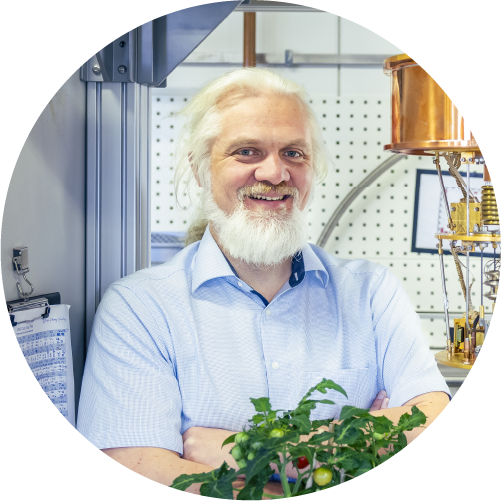Pioneering the Future of Computation
Vision for the Future – Smart!
In the quest to redefine computing, scientists worldwide are pursuing a visionary goal: reinventing computation itself. At the forefront of this endeavour is a Jülich-based spin-off, poised to propel quantum computing into the mainstream.
June 2024
Vision for the Future Smart
Quantum Computers: The Next Frontier in Computing
Imagine a machine that effortlessly optimizes logistics, predicts climate patterns, enhances battery technology, and simulates intricate molecules. Enter the quantum computer.
Researchers across the globe are unlocking the potential of the enigmatic quantum realm. Their mission? To construct a computational marvel that outshines even today’s most powerful supercomputers.
ARQUE Systems: Pioneering Quantum Supremacy
Meet Hendrik Bluhm, a physicist with unwavering dedication, and Markus Beckers, an ex-innovation consultant and mechanical engineer. Together, they founded ARQUE Systems GmbH in September 2022—a spin-off rooted in the Jülich Aachen Research Alliance (JARA). Despite their diverse backgrounds, their shared fascination with quantum possibilities drives them toward shaping tomorrow’s computers.
Prof. Hendrik Bluhm: Portrait of an Expert Physicist

»Sometimes, a clever idea is all it takes to transform everything.«
Prof. Hendrik Bluhm
Co-founder of ARQUE Systems
Qubits: The Building Blocks of Quantum Computers
At the heart of quantum computing lies the concept of qubits. Unlike classical bits, which can only represent 0 or 1, qubits can exist in multiple states simultaneously. With just two qubits, we access four states; with ten, over a thousand. Quantum computers rapidly outgrow the memory capacities of today’s machines.
Moreover, qubits exhibit a unique property called entanglement. When one qubit changes, its entangled counterpart instantly adjusts—a phenomenon that boosts computational power. Theoretically, these features render qubit-based computers unbeatable.
ARQUE Systems receives RWTH Spin-off Award
Challenges in Practical Quantum Informatic
In the realm of quantum informatics, the journey from theoretical prototypes to real-world impact is both exhilarating and complex. Hendrik Bluhm candidly acknowledges that while initial prototypes exist, they remain far from robust enough for practical applications. The crux of the matter lies in the vulnerability of quantum chips—susceptible to external influences like heat radiation and cosmic background radiation. These interferences introduce computational errors, necessitating a substantial number of qubits to correct them. Bluhm emphasizes that many envisioned applications demand millions of qubits, underscoring the need for scalable systems.
EPIQ: Crafting a Quantum Supercomputer in NRW
Superconducting Materials vs. Semiconductors: Divergent Approaches to Quantum Computing
Two divergent approaches dominate the quantum landscape: superconducting materials versus semiconductors. Hendrik Bluhm and Markus Beckers champion the latter, focusing on qubits based on silicon semiconductors. These qubits store information within individual electrons. Their venture, ARQUE Systems, aims to elevate quantum technology to new heights. With support from semiconductor giant Infineon in Dresden, they forge ahead.
“Our approach boasts several advantages,” explains Beckers. “First, our chip fabrication aligns with standard semiconductor processes, leveraging familiar materials and production techniques. Additionally, our qubits exhibit greater resilience to disturbances and boast a compact physical footprint.”
Electron Shuttle: Paving the Way for Qubit Entanglement
Accommodating numerous qubits on a chip is essential, but mere coexistence isn’t sufficient—they must also be entangled. Achieving this requires close proximity between particles. The team tackles this challenge head-on, developing an “electron shuttle”—a mechanism to transport electrons as carriers of information across the chip. This innovation could seamlessly connect a multitude of qubits simultaneously.
How “Quantum-Ready” Are German Companies?
ARQUE Systems: Pioneering a German-Made Semiconductor Quantum Processor
ARQUE Systems is still at the dawn of an ambitious journey. Their mission? To create a semiconductor quantum processor right here in Germany—one that propels quantum computing toward economically significant applications. According to Bluhm, if they succeed, Europe will lead the race for the future of computation. But when will this future become our present reality? Bluhm estimates it will take years before quantum computers are widespread. Yet, as he wisely notes, sometimes a single ingenious idea can transform everything.

Quantum Computers: Cultivating a Better Harvest
Even supercomputers hit their limits when tackling intricate problems. Consider this:
"One percent of global energy consumption currently goes into nitrogen fertilizer production. Enter nitrogenase—an enzyme that could revolutionize plant-friendly nitrogen production. The catch? It remains microscopically elusive. Quantum computers might change that. Their potential could pave the way for sustainable fertilizer production, ensuring humanity’s food supply," Physicist Hendrik Bluhm explains.
– AI generated image
Eine Frage an Dr. Shai Machnes
Dr. Shai Machnes, how does QRUISE help enhance Quantum Computers?
Dr. Shai Machnes, CEO of CRUISE—a FZ Jülich spin-off

"Quantum computing is still in its infancy, and predicting the behavior of these systems remains a challenge. Physicists simulate quantum processes before building actual quantum computers, but these simulations are never entirely accurate.
The reality is that quantum systems often behave differently from what we expect. Identifying the root cause of these deviations is a complex and painstaking process.
Quantum computers are intricate and highly sensitive—tiny effects, such as minor voltage deviations, can have significant consequences.
Enter QRUISE, a spin-off from FZ Jülich , specializing in problem analysis.
Think of us as a debugging service for physical systems. Leveraging the potential of machine learning, our system acts as a junior physicist.
Just as the image generator DALL-E serves as a junior graphic designer for AI systems, our software helps researchers and companies pinpoint errors in their quantum experiments more efficiently.
QRUISE collaborates with academic projects like QSolid, which aims to develop a German-made quantum computer.
Our clientele also includes commercially operating companies.
However, our ambitions extend beyond quantum technology.
We’re currently seeking seed funding to expand our system’s applications into areas like photonics and magnetic resonance imaging (MRI).

Unique!
JUNIQ, the quantum computing infrastructure at Forschungszentrum Jülich Center, stands out for its unique features. It hosts a diverse range quantum computer technologies at various stages of development.
What makes it truly special? Through a cloud-based platform, JUNIQ provides scientists and industries across Europe with access, driving the advancement of tomorrow’s computing capabilities.
Access to Quantum Computing Infrastructure for Science and Industry
Image: Martin Leclaire Photographie
Editorial: SeitenPlan

Download the latest issue
In the realm where brilliant ideas from laboratories transform into tangible applications, our scientists redefine the boundaries of what’s possible.
Welcome to Endeavours Magazine, where we explore how FZ Jülich’s innovations shape a greener, smarter, and safer future.







